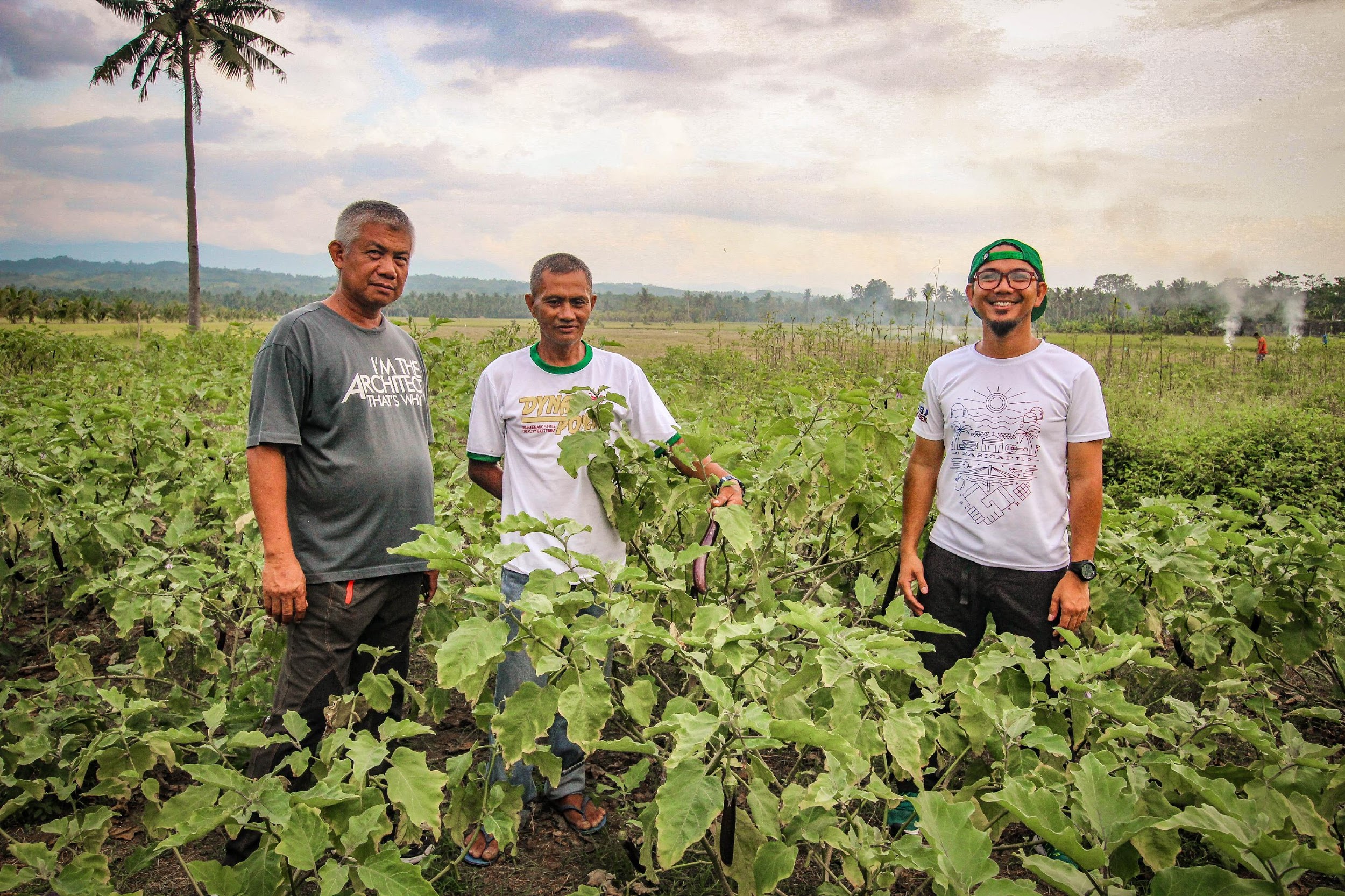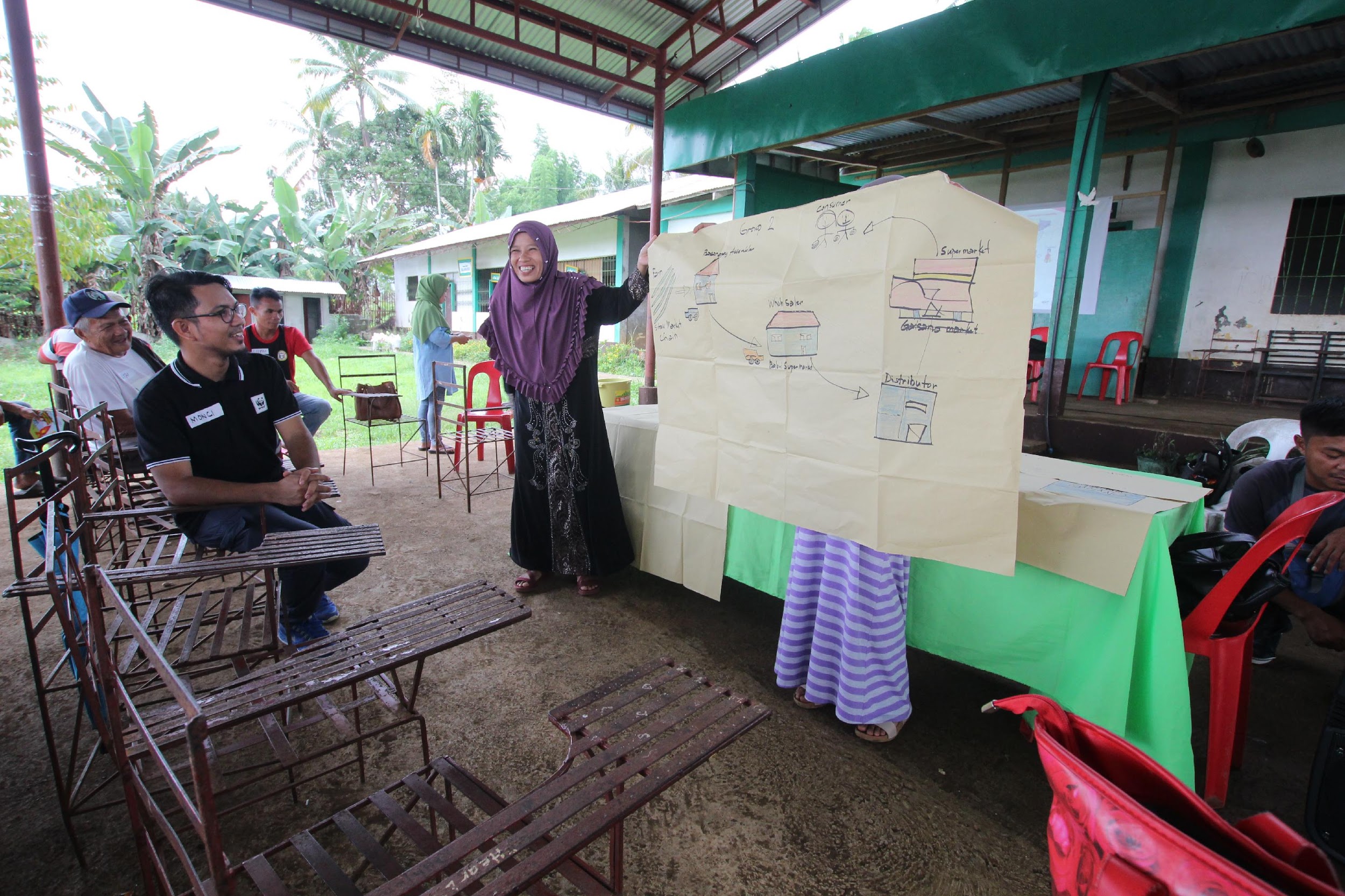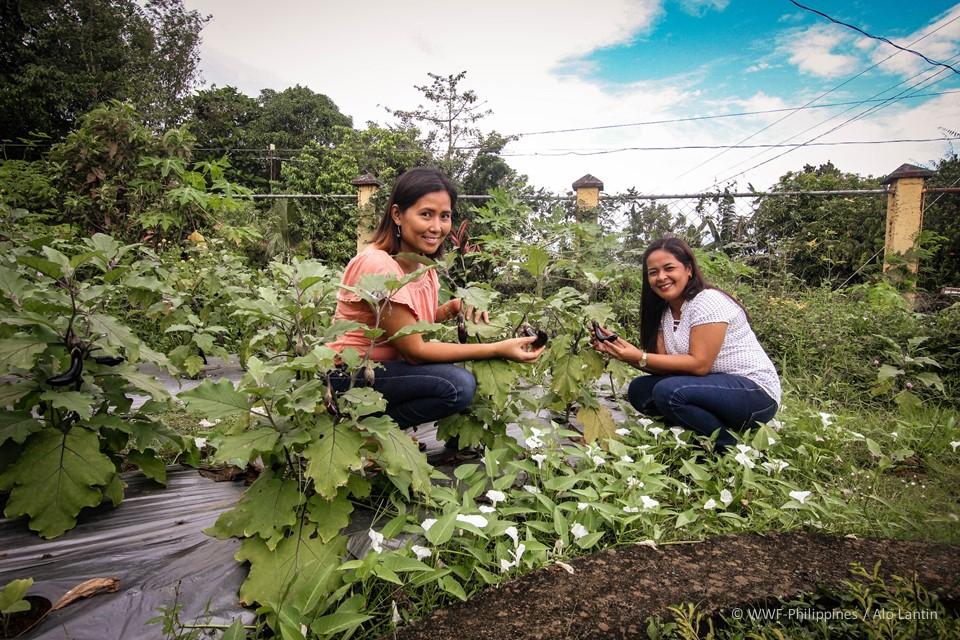Farming is Life: Uplifting Communities through Agriculture
September 2019

WWF-Philippines Sustainable Farm to Table Project Manager Muneer Hinay (Leftmost), Project Officer Zeth Antaran (Blue, second to the left) and their team joins the community of Kidalapong, Davao Occidental, for a photograph after a financial literacy workshop. Photograph © WWF-Philippines
Under the roof of a wooden waiting shed in the town of Kidapawan, a community gathers to discuss their latest savings. Elsewhere, a woman hammers down her shovel into the soil of rural Leyte as the foundations for a communal farm take hold. And on the concrete grounds of a basketball court in Bohol, men and women alike set about yellow manila papers as they plot out their very first agri-business, excited for where the future will take them.
There is wealth in farming – and these people know it.

MUAD-Negros Executive Director Reynic Alo (Left) and WWF-Philippines Sustainable Farm to Table Project Manager Muneer Hinay (Right) join a rural partner for a visit to his farm in Southern Mindanao. Photograph © Alo Lantin / WWF-Philippines
Linang: A Sustainable Farm to Table Program is the World Wide Fund for Nature (WWF) Philippines’ effort to bring food security to rural communities across the country, with the help of official partner the National Grid Corporation of the Philippines (NGCP). Through three years of workshops on agriculture, financial literacy and sustainable enterprise and through the development of networks with stores and markets, the program pushes for the prosperity and stability of rural communities through the fruits of their very own farms.
“We’re talking about communities that don’t have clear access to food. Communities whose livelihoods are unstable, and who constantly have to worry about tomorrow. That’s a difficult way to live,” says WWF-Philippines Sustainable Farm to Table Program Manager Muneer Hinay. Hinay, together with Project Officer Zeth Antaran, has watched communities grow under the program since its inception in 2017. Travelling from province to province all throughout the year, Hinay, Antaran, and the program team share the skills for sustainable livelihood with eager farmers across the country.
“I’ve watched our partners go from farmers to community leaders, entrepreneurs, advocates of sustainable farming and nutritious food. They are their own heroes,” adds Hinay.

An Islamic housewife from the town of Baloi, Lanao del Norte, holds up a quick graph she sketched with her groupmates, detailing the product life cycle of the products of her farm and how she hopes to profit from them. The Sustainable Farm to Table Program helps rural communities across the country to put up and manage their own agri-businesses. Photograph © Alo Lantin / WWF-Philippines
Throughout the years, the Sustainable Farm to Table Program has added more and more communities into its fold. Over 20 communities are now under the program, with thousands of rural partners ranging far and wide, from Pampanga to Zamboanga, Roxas to Bohol to Samar. Each community has its own story of growth and empowerment.
“It was difficult for us before. There isn’t much land to farm in our town, and many of the men and younger ones work service jobs in the city. Rice alone was already expensive. Life was unsure,” says Zenaida Quezon, housewife and community leader in Lanao del Norte, whose home town of Baloi is one of many communities to have been transformed with the help of the Sustainable Farm to Table Program. With sparse agricultural land and a high price on rice and other marketplace goods, the people of Baloi struggled with poverty. Now armed with farming skills and the knowledge to put up and manage their own agri-business, they have taken their lives into their own hands, plotting together on paper their very own plans for their community.
“Because of this program, I’m able to work. I’m able to contribute to my community and to take it to new places. I’m able to dream again,” adds Quezon.
An active leader in her own community, Quezon dreams of working alongside her fellow housewives in running their own agri-business. Through the program such a dream is possible.

Teachers from rural Capiz hold up eggplants, grown and cared for in their school’s communal farms. From farmers to schoolteachers, students and the elderly, the Sustainable Farm to Table Program brings food and livelihood security to Filipinos of all kinds. Photograph © Alo Lantin / WWF-Philippines
“It’s not just about food and livelihood security for these communities. That’s what we hope to bring them, of course. Rather, it’s about the chance to hope and have confidence. It’s about helping our communities to hope and have confidence in the fact that tomorrow, they’re going to be alright,” says Hinay.
There are still a great many communities who struggle from a lack of food and livelihood security, their lives unstable and their futures uncertain. The Sustainable Farm to Table Program is a ray of hope for these communities, reaching out to them as its partner farmers stand as a model for what life can be. Supporting WWF-Philippines means standing alongside these communities as Hinay, Antaran, and their team of development workers continue to build hope and confidence out of the natural wealth of our planet.
For more information, please contact:
Mr. Muneer Hinay
Project Manager, Sustainable Farm to Table
mhinay@wwf.org.ph
For media arrangements, please contact:
Mr. Dan Ramirez
Communications and Media Manager
dramirez@wwf.org.ph
